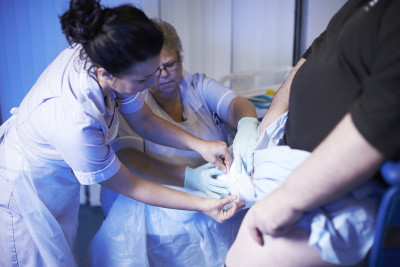More than skin deep

As part of her university studies, Tissue Viability Nurse, Laura Lodge wanted to explore a part of wound care that often goes unnoticed: The experience of living with a wound and how it affects a person beyond just the physical symptoms.
Here she explains how it led her down an exciting path — to launching wound care peer support, free for those who need it.
Laura said: "While much of wound care research focuses on the science of healing, I was drawn to the psychological impact and how mental wellbeing can influence recovery. For example, we know that stress raises cortisol levels in the body, and elevated cortisol can negatively affect wound healing. This connection made me think about the wider support available for people living with wounds. Sadly, there’s very little in place to address their psychological needs.
"In fact, despite an increasing number of studies highlighting the link between psychological stress and wound healing, these studies remain relatively small in scale. A comprehensive review by Gouin and Kiecolt-Glaser (2011) showed psychosocial factors like stress and depression can impair immune function, which plays a direct role in the wound healing process.
"My research confirmed this gap. Many people with wounds don’t receive the mental health or emotional support that could make a real difference to their wellbeing and healing journey. And considering the scope of the issue, this is deeply concerning.
"To give you a sense of the scale, a wound is defined as a break in the skin that doesn't heal through the normal process. If healing is delayed for more than six weeks, it’s classed as chronic. In the UK alone, the cost of wound care was estimated at up to £8.3 billion between 2017 and 2018 (Guest, Fuller and Vowden, 2020). That’s a huge burden on the healthcare system and it doesn’t even begin to measure the emotional toll on those affected.
"Patients with chronic, hard-to-heal wounds often have multiple other health issues which not only affect physical healing but also their mental wellbeing. It's a difficult cycle: poor mental health can slow healing, and slow healing can worsen mental health.
"There are a few reasons why. Psychological services for wound patients are limited. And with the broader mental health crisis, waiting times are long and access to care is stretched. Holistic patient care is encouraged, but in reality, emotional wellbeing is still often treated as secondary. Quality of Life indicators exist, but critics argue they don’t always capture the full, lived experience of people with wounds.
"As I finished my study, I reflected on what I could do to help change this. I felt strongly that patients need a space where they can feel heard, understood and supported by others who share similar experiences. This inspired me to start a wound care peer support group.
"The aim is simple: To create a safe, welcoming environment where people living with wounds (and their families) can come together to share their stories, offer support, and exchange practical advice. Like the saying goes: ‘a problem shared is a problem halved.’
"Looking ahead, I hope this group will become peer-led and self-sustaining, empowering members to take ownership and build a community rooted in hope, positivity and real-life support.
"It’s a small step, but I believe that together, we can make living with a wound a little less isolating and a lot more manageable."
How to join our wound care peer support group
Log on to the meeting link below, on Microsoft Teams:
First session: 2pm, Thursday, 28 August 2025.
Microsoft Teams
Meeting ID: 365 161 166 558 9
Passcode: o4vA3BG2




